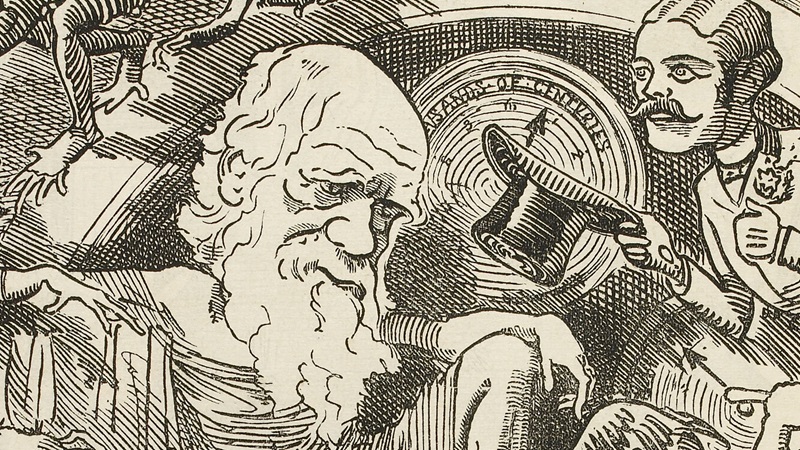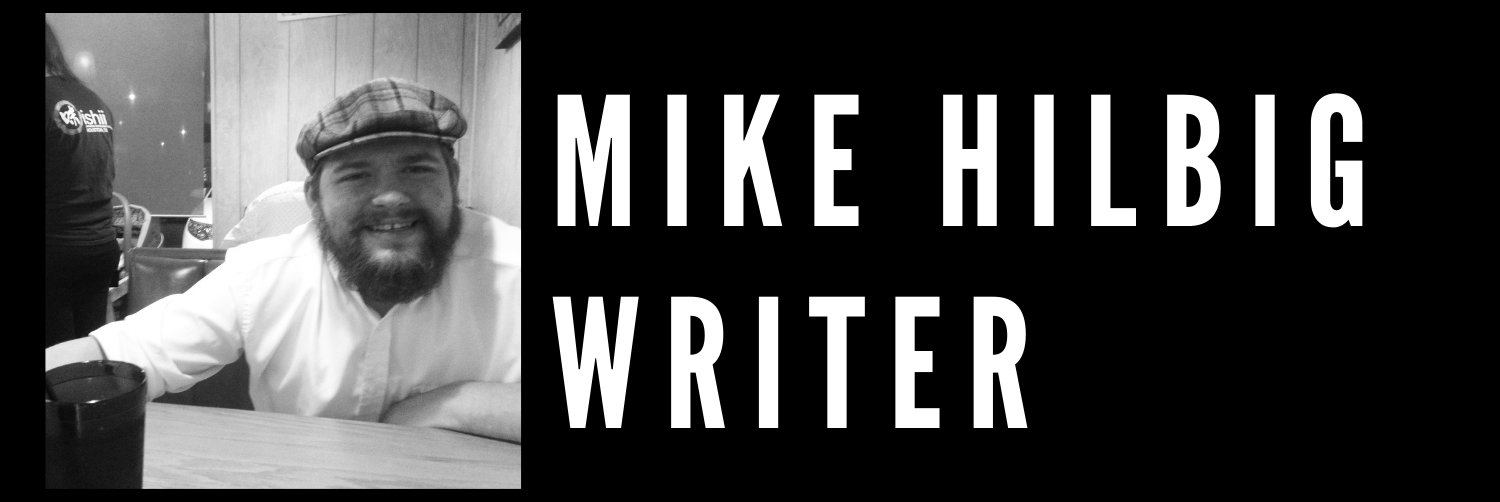
When it really boils down to it, evolution is just a spore creating the fungus of progress, feeding itself on a steaming pile of excess, ever-becoming history’s paradoxically both finished and unfinished product.”
–Stoned Philosopher #1 from “The Para(Fa)ble of the Stoned Ape.”
“The Para(fa)ble of the Stoned Ape,” the first story from Judgment Day & Other White Lies, on its surface is a witty story about Terrance McKenna’s extravagant theory that humans evolved out of a blend of consciousness between prehistoric apes and the psychedelic mushrooms they consumed. However, when you dig deeper, Para(Fa)ble is actually meant as the philosophical undergirding for the entirety of my first book itself. Essentially, it attempts to answer the question, what is progress, and how do our biological views on evolution influence the answer to that question? And furthermore, what might this idea of “progress” mean for the institutions of political rule and social culture that influence how we think as individuals?
To me, this question is deadly serious because it seems somewhere along the way in history we metaphorized this biological idea in Darwin’s theory of evolution to our much more complex and intentionally imagined political institutions. And therefore, this theory is woefully underrepresentative of the true scope of how human beings move through space and time. As such, progress narratives might do more harm than good most of the time, since they must assume that everything is always getting better.
For instance, one of the so-called progressive presidents, Woodrow Wilson, thought it was “progress” to have segregation because it helped maintain social order peacefully. In fact, all of American history is often centered on the idea that America was a “land of opportunity,” a place where people from all over would come to be born anew. Of course, what often is untold in that history is how white people’s ancestors had to exterminate untold numbers of indigenous people and then enslave a whole other race of people and bring them here against their consent to create this slate by which they could make “progress.” And not only does this narrative of progress concretize around the violent, racist, mysogynist ideas of America’s founders in the modern American political system, it also limits our possibilities to envision anything radically different in the future.
To me, the reason this narrative gets concretized is because it is a metaphor for Social Darwinism, the racist idea that undergirded eugenics, both in America and Nazi Germany. As theorist Paul Ricouer noted in his famous book The Rule of Metaphor, given enough time to develop, all metaphors become metonymys, in that all comparisons of two different things will tend to wash out the difference over time and make one different thing a literal part of the other. Like how the rose as a metaphor for love has over time become so tropish that we give roses mostly only to people we love, even though in and of themselves, a rose is just a flower like any other, and any flower could have at one point in time come to serve this purpose. SImilarly, when progress is always envisioned as an incremental route to liberation for marginalized people, those people can only ever move so far, because if they were to achieve true liberation, then there would be no way to continue to claim the blank slate on which we make yet more progress. And this is actually quite harmful to all of us. After all, because America must continue to trade on the wrongly stated inferiority of black people, it must also give unearned privilege to white people, privilege which politicians then exploit to avoid giving any of us, of any race or ethnicity, things like a healthcare plan or paid vacation time or even a steady job.
This is why the other central thrust of my book is to use metafictional elements to show how storytelling works, and how the rhetorical figures in storytelling create propaganda that becomes exceedingly hard to break once it has become a truism. And furthermore to show how these truisms are leveraged to actually avoid giving all of us or any of us progress against a ruling class that benefits so much off our division and our alienation. Like, if our focus on history is entirely biased towards our rulers, and if our ideas about how to make culture better are based on metonymys that conceal more realistic scenarios (ie. how social privilege conceals the destructive alienation of white workers from all other workers), then what does that mean for our ability to imagine our way into a new way of life, especially one that accounts for more marginalized people and for more egalitarian forms of social arrangement in general?
This is the primary question of David Graeber’s and David Wengrow’s new book The Dawn of Everything, which finds the two intellectual giants reexamining ancient and preshistoric societies from a perspective that doesn’t assume history happened along a straight-line trajectory of getting better over time, especially for only Europeans. Graeber and Wengrow ask, what if indigenous and prehistoric societies avoided the kinds of centralized nation states we see today that most fetishize the myth of progress for good reason? What if those earlier societies self-consciously modeled their social organization to avoid the kinds of long term hierarchies that make it easier to metaphorize ideas? And what if the move toward centralization was actually a mistake in history (afterall, as open-border advocate Harsha Walia would note, centralized nation states are actually a thouroughly modern idea, a mere blip on the evolutionary scale, existing really only since the India and Pakistani development of Paritition)?
To show how this model of a centralized nation state might be highly flawed, Graeber and Wengrow show how societies of the past often adopted seasonal models of organization, using more authoritarian vertical power models during hunting season, and then using more egalitarian horizontal models of organization during their feasts after the hunt. For instance, chiefs in those cultures could command bands of hunters to keep them safe, but they couldn’t bark orders at people during a party. In fact, one of the ways they held onto their authority for the next hunt was to share and tell witty stories and be gregarious at the parties. They claim this dualistic nature showed these cultures vast imaginations and meant there must have been a great deal of rhetoric and negotiation happening between them as they integrated power into their cultures, which meant they were probably as phiolosophical or more to our modern standards, and certainly they were more democratic. To note this is a far cry from the more standard evolutionary model for how centralized nation states came to be. The idea that we advanced from small bands of hunter-gatherers to become pastoral cultures, to become agrarian cultures, and finally, to become centralized economies. This can’t be true if the evidence exists that these cultures avoided centralization during times of abundance and yet still used hierarchical institutions to get things done (i.e. to make progress).
What this duality of organization reveals about humanity, to me, is far more interesting, that we have an ability to use form to fit function. Furthermore, when it comes to the complexity of how ideas are formed in conversation with other ideas, I think it shows that what we traditionally think of as progress would be far better thought of as trade-offs. You trade some liberty in times of danger for safety, whereas you trade some risk for enjoyment during what are assumedly more peaceful times.
Also, when it comes to ideas like racial progress or gender progress, especially in America, we can note these trade-offs in much more sensitive ways. For instance, how the abolishment of slavery, because of reactionary politics, gets traded for a much more punitive criminal justice system that results in mass incarceration, since the prison was the only institution given an exception by which to enslave people in the 13th amendment. Or how trans people trade their safety for the freedom they gain by coming out in the hopes that this process over time will make it more safe for trans people who follow in their footsteps. If we could account for the idea that every step in one direction is accompanied by a reactionary step in the other, might we plot the transformations we wanted to accomplish with more sensitivity and understand the ways in which our past decisions play into this process better?
Of course, this is why my Stoned Ape story is told in the dialogue form. Because the dialogue form is what a narrative actually is, a back and forth between writer and reader and future writer trading on those same ideas. And this process is dialectical, which also means that it must always be self-referential, since all ideas must allude to their forebears to carry any weight. This also makes such a process entirely dynamic and not happening in a straight line forward. This is precisely why Judgment Day & Other White Lies uses so many self-referential metafictional components to break the fourth wall of narrative and to show the self-conscious construction of my own narratives, in the hopes that readers will be skeptics of what I say as much as I attempt to be skeptical of more traditional narratives in general, especially of narratives that don’t reveal the construction of their ideas happening in dynamic with others.
To put it more simply, I often call myself a storyteller who is suspicious of stories, despite my love for them. Because stories can hijack our brains, in that very process of employing metaphors as symbols and then concretizing around those symbols. Like how police become a symbol for goodness in our collective stories that is hard to break when activists show us the real violence police exercise upon black men in our country. Or how Disney fairy tales come to teach us harmful ideas about gender before we are even old enough to fully express what gender is or what it means for us when we identify as one gender or another.
And in the end, if I accomplish one thing with this collection by revealing narrative as a form of perception which creates truths, even when not true, my hope is that when people begin to ask questions like, what is redemption, that they also ask who is it for. And that when people ask what is progress, they wonder who gets to make it, and for how long, and how might it be different if we reorganized our society along lines that didn’t just promote a straight-line to equality overtime. Like how much different might the world be if we asked instead, what tradeoffs might be necessary to create a culture and a society where all people were truly welcome and where all people could benefit from and share in both the wealth of the materials produced and the wealth of the ideas that created them? And what forms of political orgranization might help us get there fastest? And what kinds of different forms of stories might we have to tell to produce those forms of politics and sociality?
